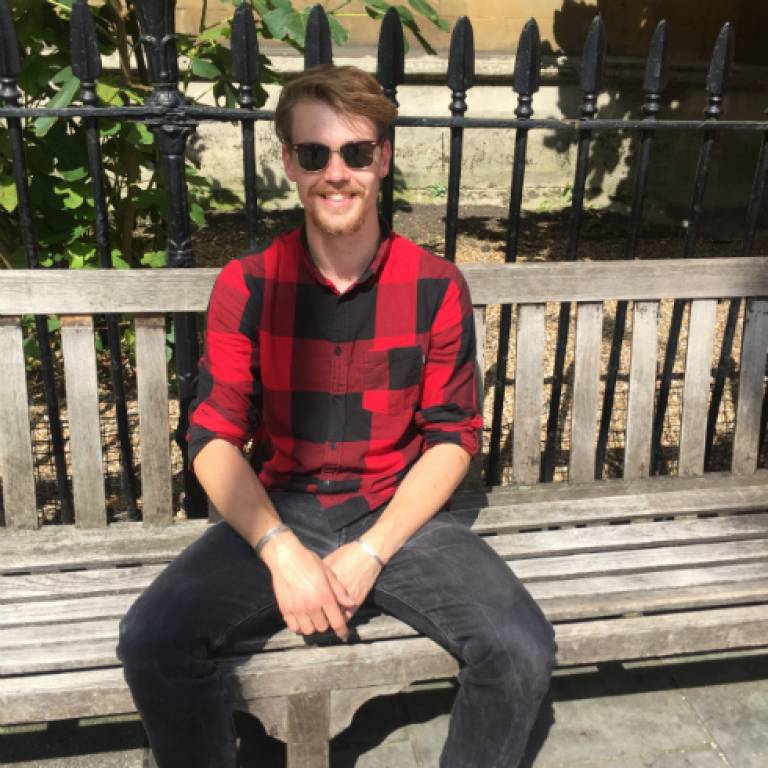Seven questions with Oscar Williams
4 September 2017
This week, meet Oscar Williams, a PhD student based in UCL Chemical Engineering, who is part of
 ucl.ac.uk/ucell" target="_self">UCell, a team of PhD students, postdocs, lecturers and industrial partners working on electricity production from hydrogen. Oscar is currently working on the UCL Hydrogen Festival and Pop-up Eco Cinema (16 September), a day of sustainable fun for all ages, in the Main Quad.
ucl.ac.uk/ucell" target="_self">UCell, a team of PhD students, postdocs, lecturers and industrial partners working on electricity production from hydrogen. Oscar is currently working on the UCL Hydrogen Festival and Pop-up Eco Cinema (16 September), a day of sustainable fun for all ages, in the Main Quad.
Research project: Hydrogen energy - a multitude
of aspects involved with producing electricity from hydrogen, and engaging
with the public to promote the idea of hydrogen fuel and the hydrogen
economy of the future
Department: UCell members are researchers from
various departments within UCL, but primarily Chemical Engineering
Members of team: A whole host of PhD students, some postdocs, lecturers and industrial
partners.
1. Tell us more about your research project:
The research carried out by our members cover a wide range of
topics that have one common theme: hydrogen, and how to use this effectively as
an energy source. More importantly, the tangible aim is to have hydrogen energy
as an alternative to fossil fuels, one that does not produce harmful pollution;
in fact, the only waste product is water! This means that the research covers
areas from the efficient (and green) production of hydrogen, all the way to
applying this hydrogen, as a fuel, to power objects such as cars.
In terms of public engagement, this is where the fun really starts. UCell travel the country giving talks and demonstrations at schools, science fairs and other events. We even power stages at music festivals, with appearances at Glastonbury, Green Man and many more. In fact, we are hosting our own UCL Hydrogen and Sustainability Festival on the 16th of September - find out more (and grab some free tickets) at theh2fest.eventbrite.co.uk.
2. What makes it so important (and interesting)?
This concerns, quite literally, the fate of the entire planet, and civilisation as we know it. Not to inflate the issue, but the world is in a state of crisis when it comes to energy, and finding renewable resources to replace the polluting fossil fuels we currently rely on is paramount. Researching and promoting hydrogen energy offers a route forwards to tackle this problem, and provides a step towards a sustainable future for us all.
3. What has been a personal highlight so far?
In terms of public engagement, organising the Hydrogen
Festival has been an amazing experience - connecting with likeminded people and
working towards a cause that is not only good for me, but good for humanity as
a whole. I honestly cannot think of anything more inspiring or rewarding.
On a more personal level, my research involves the use of a technique called scanning tunneling microscopy (STM). This is used to image atoms (yes, atoms) and monitor their behaviour in real time. So in terms of this research, nothing can beat the first image that I slaved away to achieve, in which I could resolve singular gold, titanium and oxygen atoms on a titanium dioxide surface. That was something truly beautiful, to actually see atoms that no-one has ever seen before; what's more, it is likely that no-one will ever see those same atoms again.
4. Explain some of the challenges involved in working on a research project.
Research has its ups and downs, and when you're working hard on a project day-in and day-out, you are so entirely invested in it that the downs can bring the world crashing around your ears, or so it seems. When the research doesn't go as you would expect, or when something breaks, that is when a PhD student comes into their own - it is keeping your motivation in times like this that can truly make or break you as a researcher, and as a person.
5. What advice would you give to an undergraduate student hoping to pursue a research career?
My main piece of advice, that sticks out above all else, is this: make sure that you are pursuing your research for the right reasons. Do what you love, and the rest will follow, along with a sprinkling of hard work. This is what keeps you motivated on the days when you are fixing equipment or when it seems as though you are hitting your head against a brick wall, waiting for results to materialise. But let me also say this: when the results do come through, there is no feeling on earth that can beat that elation, because you have earned those results, with blood, sweat and maybe even a few tears.
6. Any idea what's next after the project finishes?
For UCell, the project never finishes - we are always striving to
bring hydrogen energy to fruition, and constantly trying to increase awareness
about this amazing source of energy. We love doing this, and hope to keep doing
it until we are old and grey.
Personally, I would love to carry on with this line of work. I have toyed with teaching in academia, working in R&D for industry, or maybe even contributing towards scientific policy. The beautiful thing about a PhD is that it opens many many doors for the future.
7. Describe your perfect evening (or weekend) after a long week.
After a long week in the labs or engaging with people about hydrogen, I love to unwind by doing something physical. This could be rock climbing, playing squash or surfing, which can be tricky in London. After that, the perfect end is to put my feet up and relax, catching up with friends over a drink or a bite to eat. Then, lots of sleep.
 Close
Close

